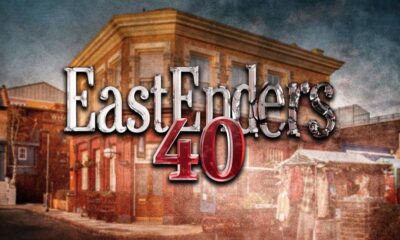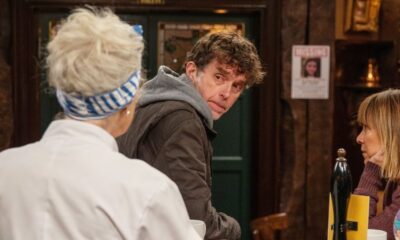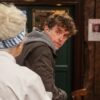The Last Farewell 2009
 ATV Network salutes those who left us in 2009 who in some way – whether in front of the camera, in music or behind the scenes in production – have contributed to the UK entertainment world. 2009 was a rather bad year for media deaths, so if we have in error missed anyone from our list we firstly apologise for that, and secondly salute them with the due respect deserved.
ATV Network salutes those who left us in 2009 who in some way – whether in front of the camera, in music or behind the scenes in production – have contributed to the UK entertainment world. 2009 was a rather bad year for media deaths, so if we have in error missed anyone from our list we firstly apologise for that, and secondly salute them with the due respect deserved. Part one of two.
ATV Network salutes those who left us in 2009 who in some way – whether in front of the camera, in music or behind the scenes in production – have contributed to the UK entertainment world. 2009 was a rather bad year for media deaths, so if we have in error missed anyone from our list we firstly apologise for that, and secondly salute them with the due respect deserved.

Arguably the ‘biggest shock’ death of the year was that of the ‘King Of Pop’ Michael Jackson, others would suggest that his lifestyle may not have made it such a shock after all. Troubled practically his entire life with one personal crisis or another Jackson became in some quarters more famous for his real-life dramas rather than his creative musical talent. Michael Jackson was born August 29th 1958, the eighth of ten children. The working-class African-American family resided in what has been described as an “industrial suburb of Chicago” – where the family, and in particular father Joe, dreamed of an escape through the singing and dancing talent of the brothers.
Forty-five years ago Michael made his professional debut as the lead vocalist in pop-Motown group The Jackson 5 alongside his four elder brothers. By the late 1960s the band had released a string of hits, with four consecutive American number one’s – I Want You Back, ABC, The Love You Save and I’ll Be There. While part of the Jackson 5 Michael launched his solo career in 1971, releasing three albums while still part of the group. In 1975, with a change of record label the 5 became simply The Jacksons and for a further nine years the brothers would release hits such as Can You Feel It. By the late 1970s Jackson was clearly the star of the unit and he began to promote his solo work equally alongside the family output. In 1979 songs such as Rock With You and Don’t Stop ‘Til You Get Enough sealed his solo success, the following year Jackson won three awards at the American Music Awards – Favorite Soul/R&B Album, Favorite Male Soul/R&B Artist, and Favorite Soul/R&B Single for Don’t Stop ‘Til You Get Enough, this track also earned him the Grammy Award for Best Male R&B Vocal Performance. The Billboard Music Awards also honoured him with gongs such as Top Black Artist and Top Black Album.
The start of the world-wide phenomenon that became Michael Jackson arrived in 1982 with the Thriller album – which to date remains the best selling album of all-time. At the peak of his 1980s success Jackson’s hair was set alight while recording a commercial for Pepsi when pyrotechnics were launched accidentally early, suffering second-degree burns to the scalp – and so began his need for pain killers. Recovered, another album, Bad, followed in 1987 and then he dabbled in the movie industry. The 1990s were to see further mixed fortunes for Jackson, professionally great success, but once more his personal life would be subject to much controversy. The Dangerous album was released in 1991, he also released a track, Gone Too Soon, in tribute to the young Aids sufferer Ryan White who died aged just 19. White had been contaminated via a blood transfusion. He also founded the Heal The World charity, which set about helping under privileged children.
However, it was his private affairs which would dominate the headlines. Notably his seemingly ever-changing appearance, from his skin tones to the shape and size of his nose he became in some circles a joke figure. “Whacko Jacko”. It wasn’t just his looks that started tabloids and people talking, his child-like antics started to fuel speculation the Peter Pan of Pop was more than just friends with other young boys and in 1993 this un-founded gossip came to a head when he was accused of sex abuse, no charges were however brought against the star. This in itself kept the gossip fueled with those not so keen on Jackson suggesting the ‘victim’ had been ‘gagged’ with money.
A year later, in an attempt to stem the previous years woes, Michael married pop-royalty Lisa Marie Presley – daughter of crooner, rocker and burger loving, jumpsuit wearing, Elvis Presley. They divorced two years later, but remained friends – having met in the 1970s and become close over the subsequent decades. Back to the music in 1995 with his History, (spoken as His-Story) album, with notably Earth Song dominating the charts towards the end of the year – proving if nothing his fans were loyal and unaffected by the previous allegations towards him.
In late 1996 he married for a second time to Deborah Jeanne Rowe, a dermatology nurse who had been an acquaintance since the 1980s. The couple had two children together, but they went their separate ways in 1999, leaving Jackson with custody of the children – something that would cause him further negative headlines in the years that followed though his ‘parenting skills’ or lack of.
Professionally another album was released in 2001, and issues between himself and Sony-ATV Music hit the headlines which resulted in Jackson leaving the label which he half owned. It wasn’t long before the world was refocused back onto his private life when he revealed his third child – the mother has never been identified and he claimed the pregnancy was via artificial insemination, ‘cha’mone’ indeed. Being a father however caused him to become once again the butt of people’s jokes in 2002 when he was seen dangling his youngest out of a hotel window.
BBC Newsround reported the event at the time: “Singer Michael Jackson’s shocked a crowd of fans by dangling his baby son out of a hotel window. The oddball star was staying at a hotel in Germany and held Prince Michael II – whose head was covered by a white sheet – over the iron rail of the balcony. People in the crowd were shocked and the scene went out on TV.”
Jackson later appologised for the gaff, saying he only did it as fans were asking to see the child!
In 2003 his close friend, and aleged spoon bender, Uri Geller advised Jackson to show the world the real man behind the strange hairdos, odd clothes and ever-changing face. ITV company Granada Television produced a special documentary for their Tonight strand with reporter Martin Bashir. Living with Michael Jackson, which was hoped by Jackson to show the world he wasn’t odd or as ‘whacko’ as the press made out had the opposite effect. After footage was shown of the popstar holding hands and discussing sleeping arrangements with 13-year-old Gavin Arvizo it was only a matter of time before further allegations of child abuse would raise their head. Shortly after the documentary aired, Jackson was charged with seven counts of child molestation and two counts of administering an intoxicating agent after complaints were made to the police by the Arvizo family of abuse by the star. It took two years before the case reached court, in which time its reported Michael became addicted to Pethidine. In 2005, after a five month court case, he was acquitted of all the charges.
Despite the second child abuse issues, Michael Jackson’s fans remained once again loyal to their icon, and his reputation musically survived unscathed, his songs continued, and still continue, to have regular air play on radio stations around the globe. However it was the beginning of the end for Jackson, reported debts and the worries of the trial had taken their toll on the pop king. Various reports on the financial issues concerning Michael were frequently reported during his final years. In March 2009 he held a press conference announcing he would be performing a new set of live shows at London’s o2 arena, the first main tour by the star in 12 years. The This Is It tour would run from the summer of 2009. However it wasn’t to happen, on June 25th he collapsed at his rented mansion in Los Angeles just days before the tour was due to start. Despite several resuscitating attempts Michael Jackson was pronounced dead 2:26 p.m. local time.
In Brief
George Cowling – the first televised BBC Weatherman. George began his forecasting career with the RAF in Yorkshire before switching to the BBC in 1954. Aged 32 Cowling presented the first in-vision weather summary from the BBC Lime Grove Studio in London on January 11th 1954. The live forecast airing at 7.55pm. In 1957 he returned to the RAF before retiring in 1981.
John Bentley – actor.
John was a popular face of ITV during the 1950s, 60s and 70s. His biggest role was that of Hugh Mortimer in the ATV Network soap opera, Crossroads which he appeared in from 1965 to 1977. He had many other successes on television, film and in theatre. He spent time in Hollywood, but preferred living and working in England. He took the lead role in drama African Patrol and was a regular singer on live entertainment and variety show, Lunchbox.
Bob Phillis – Media Executive. Bob began his media career working in local newspapers before moving to the TV Times in 1979 – which at that time was owned by the ITV companies and was produced on their behalf by Independent Television Publications which he took a senior role in. He was also responsible for over-seeing ITV Publications’ other titles including Look-In Magazine for children, TV Times Extra and numerous special books concerning ITV programming.
In 1981 Phillis moved to ATV Network Limited as Managing Director, overseeing the launch of the new company, ATV Midlands Limited, which became known on-screen as Central – and the company re-branded as Central Independent Television, of which ATV Network continued to have part ownership for some time after the on-screen name change. In 1987 he switched to Carlton UK and in 1991 news provider ITN. In 1993 Phillis moved from commercial broadcasting to the BBC, as deputy director general, before returning to print media in 1997 with the Guardian Publishing Group. Bob was knighted in 2004.
Marianne Stone – actress. Marianne is probably best known for her parts in the Carry On movie franchise which frequented the cinema screens of the 1960s and 70s. In all she starred in nine Carry On films as well as popping up in one episode of the ATV Network produced Carry On Laughing television spin-off. It wasn’t just comedy, appearing in serious wartime drama, Secret Army for the BBC saw Stone in a dramatic role. The actress appeared in three episodes of the wartime drama across its first two seasons.
Donald Pickering – actor. A well known face on television appearing in a wide range of dramas and comedies across the years. Amongst his many roles where three separate appearances in Doctor Who; his first appearance was in the 1964 story The Keys of Marinus which was written by Terry Nation. Pickering’s next appearance was in 1967, during Patrick Troughton’s tenure as the Time Lord, in the story The Faceless Ones. His final appearance in the science fiction series was in 1987 in Sylvester McCoy’s debut story; Time and the Rani where he guest starred alongside Kate O’Mara and Wanda Ventham.
 Keith was one of the first of what has become known as the ‘celebrity chef’. He would often be seen drinking wine while showing off his culinary techniques. In his early days he became a lieutenant in the 3rd Royal Tank Regiment. Floyd, having run a successful restaurant from 1971 onwards broke into broadcasting first of all on radio. With regular guest spots on commercial station Radio West in Bristol, he was the west radio chef. Local BBC producer David Pritchard hired him for a couple of television appearances on a regional magazine show which in turn led, in 1984, to his first networked TV series Floyd On Fish.
Keith was one of the first of what has become known as the ‘celebrity chef’. He would often be seen drinking wine while showing off his culinary techniques. In his early days he became a lieutenant in the 3rd Royal Tank Regiment. Floyd, having run a successful restaurant from 1971 onwards broke into broadcasting first of all on radio. With regular guest spots on commercial station Radio West in Bristol, he was the west radio chef. Local BBC producer David Pritchard hired him for a couple of television appearances on a regional magazine show which in turn led, in 1984, to his first networked TV series Floyd On Fish.
Keith has also been credited as a pioneer of making cooking programmes more interesting by re-locating them out of the studio. Nowhere was safe from his traveling kitchen; France, Spain, Italy, India, Australia and America were all home to Floyds on location programmes.
Marco Pierre White, who presides over Hell’s Kitchen told BBC Radio Four “Keith, in my opinion, was an exceptional human being. He had great qualities.”
Floyd had been suffering from bowel cancer, which only became public knowledge in July 2009. He made his final appearance on Channel 4 in a show recorded just before his death – which aired the night he died. The last words he wrote on his ‘Floyd Uncorked’ blog simply read “to be continued…”
In Brief
Moyra Fraser – actress. Moyra is best known for her role in BBC sitcom As Time Goes By as the long-running character of Penny between 1992 and 2005. Other roles include Felicity in four episodes of The Good Life, Annie in From The Top and numerous guest roles in shows ranging from the slapstick comedy of The Benny Hill Show to serious drama in the ITV Playhouse.
Buster Elvis O’Grady – television personality. The four-legged shih tzu and bichon frise cross was a
 stray which comedian Paul O’Grady ‘adopted’ nearly fifteen years ago. In the 1990s O’Grady appeared as drag act Lily Savage and Buster made appearances alongside the scouse tart, notibly daily on The Big Breakfast for Channel 4. It wasn’t until 2004 however that Buster became “as famous” as O’Grady himself on the teatime chat show, The Paul O’Grady Show – the dog’s rise to fame was quite by accident, however. The original episodes of the programme featured only Paul, but after a ‘guest appearance’ by Buster the dog became a regular.
stray which comedian Paul O’Grady ‘adopted’ nearly fifteen years ago. In the 1990s O’Grady appeared as drag act Lily Savage and Buster made appearances alongside the scouse tart, notibly daily on The Big Breakfast for Channel 4. It wasn’t until 2004 however that Buster became “as famous” as O’Grady himself on the teatime chat show, The Paul O’Grady Show – the dog’s rise to fame was quite by accident, however. The original episodes of the programme featured only Paul, but after a ‘guest appearance’ by Buster the dog became a regular.Buster, who was almost fifteen, had been suffering from cancer and arthritis and it was decided it would be best for the popular four-legged telly star to be put to sleep. He left the screens only a week before his death, and had earlier this year won the TV Times‘ ‘Best Dog On TV’ gong.
Garfield Morgan – actor. A well known theatre actor, who made his television début in 1955. In the first series of long running cop-drama Softly Softly Morgan played Detective Gwyn Lewis for the BBC. Sticking with the crime drama he switched to ITV and became best known for his role in Thames Television’s iconic London-based The Sweeney starring John Thaw and Dennis Waterman in the title roles. He played Chief Inspector Frank Haskins in the gritty serial.
Garfield has a wide range of guest appearances, including comedy with On The Buses, George and Mildred and The Likey Lads and serious roles in productions including Bad Girls, Holby City, Crown Court and Minder.
Dilys Laye – Actress. The wife of Garfield Morgan died ten months before her husband after a battle with lung cancer. The actress had a long and varied career with having appeared in a variety of films, television and stage shows. Amongst her more famous roles were parts in four Carry On films. The first in 1962, the character of Flo Castle, in Carry On Cruising. In 1964 the actress returned to the film franchise for Carry On Spying, a spoof of the James Bond films, where she played double-agent Lila. Her third Carry On film was 1967’s Carry On Doctor, widely regarded as one of the best films in the series. In the film she played patient Mavis who enjoyed a romance with Bernard Bresslaw’s character. Her final Carry On film was 1969’s Carry On Camping, also highly regarded, where she played Anthea.
On television the actress appeared in a wide variety of dramas, she had a recurring role in Coronation Street as Isobel Stephens as well as guest starring in soaps Doctors and EastEnders. In 2008 she appeared in two dramas, playing Frankie Howard’s mother in BBC Four’s Rather You Than Me and appearing in ITV’s The Commander.
Margaret Christensen – actress and radio host. Best known in the UK for her role in ATV Network serial Crossroads. Australian actress Margaret forged a career in radio before, in 1959, re-located to Britain in the hope of a wider range of acting work. Living in the UK she worked for the BBC in radio, the theatre – including in the West End in Noel Coward’s Sail Away and for ITV in the long running daytime motel soap.
Barry Letts – producer. Notibly the producer of Doctor Who in the Jon Pertwee ‘Third Doctor’ era. Letts also directed BBC serial EastEnders and several big budget corporation dramas. Letts career began as an actor working in repertory theatre in York with his first television acting role being in the 1950s production of Gunpowder Guy, a drama about Guy Fawkes. In 1967 he decided to move from acting into directing and took part in the BBC’s Director Training Course. As a director he worked on episodes of crime drama Z Cars and twice-weekly serial The Newcomers before directing the six-part Doctor Who story The Enemy of the World in 1967. In 1968 he joined local BBC Radio in Leeds, however it would be television drama that made his name.
He became the producer of Doctor Who in 1969 and remained in that post until 1974; overseeing one of its most popular and fondly remembered eras with Jon Pertwee as the doctor. Working closely with script editor and former Crossroads writer Terrance Dicks, Letts oversaw the creative direction and production of the programme for the following five seasons of the science fiction drama, and returned to direct a story for ‘Who’ again in 1975, before taking up the position of BBC Classical Serials Producer.
In 1980 he returned once more to Doctor Who as Executive Producer, and in more recent years he had over-seen radio versions of the show produced as well as taking part in the production of classic episodes being released on DVD. In the 1990s he returned to serial directing episodes of the then twice-weekly EastEnders from 1990 to 1992, at the Elstree Studios – where EastEnders is based – Letts also taught directing courses for the BBC during the 80s and 90s.
Letts’s legacy with Doctor Who continues in the new series, and its modern spin-offs, with his creation of the character Sarah Jane Smith – played by Elisabeth Sladen – still featuring occasionally in the main series as well as the character also having her own CBBC show, The Sarah Jane Adventures.
In Brief
John Stroud – producer. Best known for his comedy work, died aged only 54 from a brain tumour. His most recent work had included BBC One sitcom, My Hero, however his career spans over thirty years. Stroud first broke into broadcasting as a trainee director at production company Thames Television – who at the time also broadcast on ITV in the London region. This enabled John to work on a variety of programming, starting off in the company’s children’s department producing Sooty and Rainbow.
David Tree – actor. David first appeared in movies in 1937 with numerous small and more meaty character parts. He spent the majority of his career however in the theatre. Tree started up a farm which lead to a book about his life in 1966 and the struggles he’d faced in the process, the book Pig In The Middle was the basis of what became the BBC sitcom, The Good Life. He returned to the big screen in the early 1970s with an appearance in horror flick, Don’t Look Now.
Malcolm Laycock – radio personality. A radio career which spans four decades Malcolm Laycock is most famous for his jazz-related programmes. For 20 years he was heard on Radio London, before switching to the BBC World Service and latterly BBC Radio 2 which he joined in 1994 and remained with until summer 2009.
Gene Barry – actor. Barry is probably best remembered for his roles in a series of high-profile and fondly remembered television shows such as Bat Masterton in the late 1950s and early 60s, The Name of the Game and The Adventurer alongside Catherine Schell in the 1970s. Barry also starred in the original series of Burke’s Law between 1963 and 1966 and its revival in the mid 1990’s where he reprised his role of Amos Burke.
Norman Painting – actor and writer. Most famous for playing the part of Philip Archer in The Archers since its trial run in 1950. He was also script-writer on the programme, now broadcast on BBC Radio 4, from 1966 to 1982. He has appeared in a variety of radio and television programmes including Call My Bluff for BBC Two, Radio 4’s Quote… Unquote… and On The Air for BBC Radio 2. He was also the castaway on Desert Island Discs as part of The Archers’ 50th anniversary celebration programmes on New Year’s Day 2001. In 1967, along with Edward J Mason, he received a Writers’ Guild Award. In 1991 he was the subject of This Is Your Life.
“He rightly became renowned for his portrayal of Phil Archer, a role he created in the pilot episode in 1950, but he was also a gifted writer and talented versatile broadcaster. He was a pillar of The Archers family, but o millions of listeners he became a friend and latterly a wonderful father figure.”
Simon Dee – radio DJ and television presenter.
Back in the 1960s and early 1970s Simon Dee was ‘cool’ to watch, his shows were trendy and “with it” – he was the voice of a generation. Dee found media-fame through pirate radio. He was one of the first voices, back in March of 1964, to be heard on cult broadcaster Radio Caroline. In the mid-1960s he switched to legal broadcasting with BBC Radio, hosting a hit-parade pop show entitled Midday Spin. A face of Radio One Dee switched to television in 1967 to co-host many editions of music chart show, Top Of The Pops. This lead to BBC One controller Paul Fox offering Dee his own tea-time chat show.
Running from 1967 to 1969 Dee Time captured the spirit of the Swinging Sixties. As the BFI comment: “With its carefree attitude, epitomised by the show’s closing credits, featuring Dee driving E type Jag next to a blonde. This quickly became a visual cliché, parodied by everyone from Benny Hill to Alexei Sayle. A reference even found its way into Austin Powers: International Man of Mystery. The show also gave a nod to the legendary Johnny Carson Show in America: each week Simon was introduced by the convoluted It’s SI-I-I-I-mon DEE!”
Dee’s care-free approach to presenting and interviewing made him a hit with young audiences, but was condemned by the older viewers. Speaking on a BBC viewers feedback programme one member of the public commented on Dee: “Our declining standards of morality are due to the filth we see on television.” His spontaneous retorts made him a controversial figure, however he was never vulgar or over the edge on television. Off-screen however he made his views clear, he spoke out against racism, he made his political opinions known – including his distaste at PM Harold Wilson. His no-nonsense approach on and off screen gave Dee Time audiences of up to fifteen million viewers at its peak.
He quit the BBC and moved to the recently launched, ITV weekend contractor, London Weekend Television. They offered him a late night Sunday slot, The Simon Dee Show. However it never captured the ‘magic’ his Dee Time format had, and after a few months LWT axed the series in 1970. The 1970s, 80s and 90s Dee spent appearing occasionally as a guest or talking head on programmes; however he never regained a regular position on television, this is put down to him having ‘offended’ the BBC and ITV executives in equal measures.
By the mid-1970s Dee, unemployed, was shown in the press signing on the dole at the Fulham Labour Exchange. In 1978 he was imprisoned for unpaid debts. In recent years Simon Dee was looked upon as an innovated, years ahead of his time. With his re-found “hip” status Channel 4 gave him a night in their schedules in 2003. A live edition of Dee Time was aired and a documentary Dee Construction followed. Further guest spots then were offered on various channels. Its reported that only two full editions of the BBC Dee Time from the sixties survives, with every single edition of his London Weekend Television series wiped. Only a short segment from one edition of the ITV series survives, -which rather like his television career proved to be unfortunate in its demise.
In Brief
Patrick Swayze – actor. Probably best known for his roles in movies Dirty Dancing and Ghost. The actor was diagnosed with pancreatic cancer in March 2008 and despite his illness the actor took the lead role in drama series The Beast, as an undercover FBI agent, and also wrote his autobiography with his wife, Lisa Niemi. Swayze also had roles in various other dramas and films such as Donnie Darko, Green Dragon, Jump and Next of Kin.
Maggie Jones – actress. She was the sharp-tongued, fast witted Blanche Hunt in Coronation Street who became loved by millions for her role as the Weatherfield pensioner and mother of mainstay Dierdre Barlow. Maggie first appeared in Coronation Street as Blanche in 1974, spending three years as a regular before returning for several short stints during the late 70s and 1980s.
 Mollie Sugden – actress. Another former Coronation Street actress who was however best known for her role as brassy old bird Mrs Slocombe in BBC sitcom Are You Being Served? Mollie trained at the Guildhall School of Music and Drama before moving onto an apprenticeship with a repertory theatre company. Her first big TV break was in comedy Hugh and I back in 1962. Other bit parts followed in series such as The Dick Emery Show, Up Pompii, The Benny Hill Show and Steptoe and Son. She also starred in leading roles in the Yorkshire Television sitcom That’s My Boy and the BBC’s Come Back Mrs Noah.
Mollie Sugden – actress. Another former Coronation Street actress who was however best known for her role as brassy old bird Mrs Slocombe in BBC sitcom Are You Being Served? Mollie trained at the Guildhall School of Music and Drama before moving onto an apprenticeship with a repertory theatre company. Her first big TV break was in comedy Hugh and I back in 1962. Other bit parts followed in series such as The Dick Emery Show, Up Pompii, The Benny Hill Show and Steptoe and Son. She also starred in leading roles in the Yorkshire Television sitcom That’s My Boy and the BBC’s Come Back Mrs Noah.The Yorkshire-born performer worked on numerous programmes for both the BBC and ITV over a long and distinguished career which was still going strong in the early 1990s; with parts in Grace and Favour – the Are You Being Served? Spin-off – and a revived series of The Liver Birds, which she first appeared in back in the early 1970s. In Coronation Street, from 1965 to 1976, she starred as landlady of The Laughing Donkey Nellie Harvey who came into conflict on several occasions with Rovers
proprietor Annie Walker.“She would never refuse any sort of comedy situation no matter how undignified it was she would always go along with it. She was marvellously funny,”
Pat Keysell – presenter. Pat was a ground-breaker in television terms. In 1964, she began presenting Vision On – the children’s art-based series which is credited as being the first television programme to successfully bring hearing deaf and hearing children together. The show used sign language, mime acts and special visual effect to communicate via vision rather than sound. The show was co-presented by Tony Hart.
Lennie Bennett – Comedian and presenter. Famous for presenting numerous ITV game shows in the 1970s, 80s and 90s. Famously Punchlines and Lucky Ladders. He also starred in over ten Royal Variety Shows and hosted his own chat show for London Weekend Teleivsion.
Stephanie Parker – actress. Died aged only 22 after committing suicide. Was a popular face on BBC Wales in their series Belonging. She also starred in a number of BBC Radio 4 dramas and a guest spot in Bristol-based drama, Casualty.
Peter Dennis – Actor. A career which spanned both sides of the Atlantic he starred in action adventure series The Avengers for Thames as well as their drama Minder. Other notable appearances include in BBC sitcom Yes, Minister and children’s drama, Grange Hill.
Peter Rogers – producer of the Carry On series of films.
Rogers was one half of the creative duo that brought the Carry On franchise to screens with his partnership with director Gerald Thomas spanning 31 films between 1958 and 1992. A new entry in the franchise has been in development for several years with the rumoured title of Carry on London. Many names have been attached to the project but it’s been stuck in limbo for some time now. With the death of Rogers it seems unlikely the film will enter production.
Rogers and Thomas gave the world the very first Carry On film in 1958 with the first entry in the series being Carry On Sergeant. The success of the films made the duo one of the best known British producers of their time and the series is still one of the longest running in the world. As well as the Carry On films Rogers also produced the ATV Network television series Carry on Laughing.
Other films produced by Rogers included Bless This House and The Big Job.
Maurice Lindsay – writer and executive. Wrote numerous poems, before joining the BBC as a radio broadcaster. He later became programme controller for ITV North West station, Border Television.











